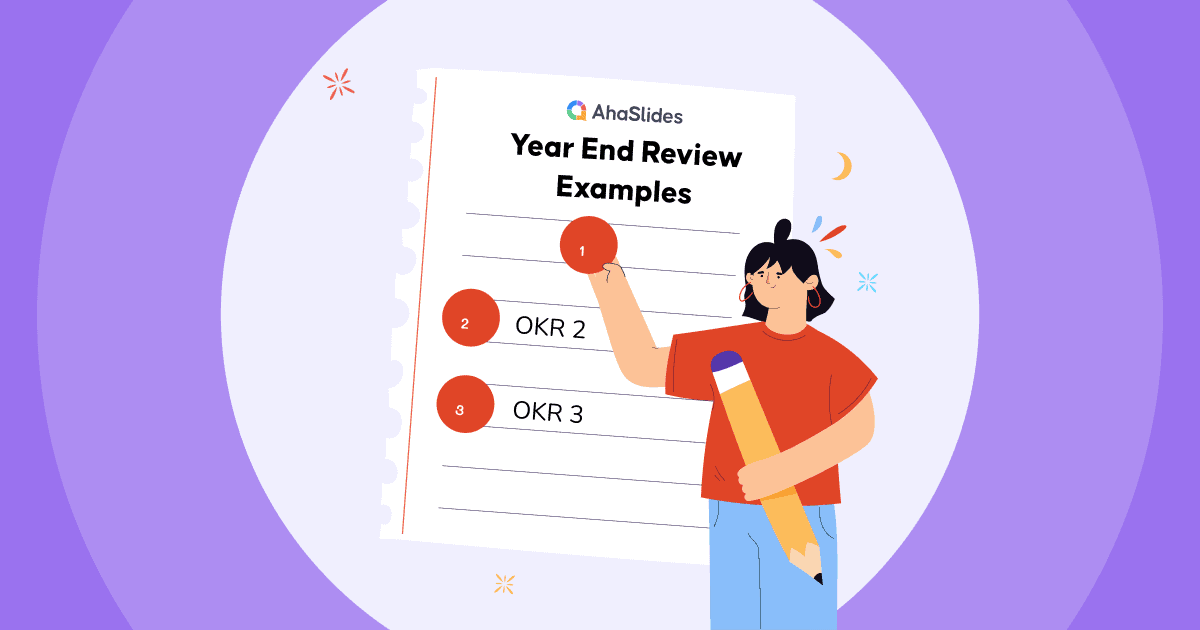We learn and grow through self-reflection and past experiences.
In our career, conducting an employee self assessment is a great way to see what we have accomplished, what we are lacking and how we want to shape our future in our company.
✅ A self-evaluation is not hard to write at all. In this guide, we will show you tips and tricks on how to write a great and thoroughly-planned employee self-assessment.
Table of Contents
- What is an Employee Self Assessment?
- Why is Employee Self Assessment Important?
- What Should I Say on My Self-Evaluation?
- How to Write Good Employee Self Assessment
- What is an Example of a Good Self Evaluation for Performance Review?
- Bottom Line
- Frequently Asked Questions
What is an Employee Self Assessment?

An employee self-assessment is a process where an employee evaluates and reflects on their own performance, strengths, and weaknesses. It often involves an employee completing a self-assessment form or questionnaire. The purpose of employee self-assessments is multi-fold:
• Self-reflection and development: Self-assessments encourage employees to think critically about their own performance and identify areas for improvement and development. This can help employees gain self-awareness and create a personal development plan.
• Input for performance reviews: Self-assessments provide input for employee performance reviews. Managers can compare the employee's self-assessment with their own evaluation of the employee's performance to identify any gaps in perceptions. This often leads to a more constructive performance review discussion.
• Alignment of goals: Self-assessments can help to align employee and company goals. Employees can evaluate their performance relative to their job responsibilities and company goals and strategy.
• Increased motivation and accountability: Employees who are involved in assessing their own performance may feel more motivated, accountable and invested in their development.
Make Feedbacks Easy-Breezy
💡 Best Employee Engagement Survey
💡 Employee Satisfaction Survey💡 Best General Survey Templates and Examples
Conduct surveys and gather opinions whenever you want
AhaSlides provide intuitive features like anonymous Q&A, open-ended poll, ordinal scale feedback for organisations.
Get started for free
Why is Employee Self Assessment Important?
Did you know that self-assessments by employees can be super helpful for both employees and managers? Here are some key advantages to keep in mind:

For employees:
• Development - It encourages self-reflection and can help them identify areas for growth, skills they need to work on, and goals for development.
• Motivation - Performing a self-assessment can motivate employees by making them accountable for their own performance and progress.
• Voice - It gives employees a chance to provide input into the performance review process and express their own perspective.
• Ownership - Self-assessments can make employees feel more invested in and take more ownership of their performance and development.
For managers:
• Feedback - It provides valuable feedback from the employee's point of view that managers may not otherwise get.
• Insights - Self-assessments can reveal new insights into an employee's strengths, weaknesses and motivations.
• Development plans - The self-assessment process helps identify specific development goals and plans that the manager can support.
• Alignment - It helps ensure employees' goals are aligned with business objectives and strategies.
• Objectivity - Managers can use the self-assessment as a benchmark to evaluate how objective the employee is being.
• Difficult conversations - Self-assessments can make it easier to have difficult performance-related conversations by starting with what the employee themselves has identified.
So in summary, while self-assessments primarily benefit employees through self-reflection and development, they also provide valuable insights, feedback and context for managers to develop, coach and manage their people more effectively. But managers must still objectively validate self-assessments and provide coaching and performance feedback.
What Should I Say on My Self-Evaluation?

Regardless of the industry you're in, here are the general guidelines when crafting an employee self-assessment:
• Strengths and achievements: Call out any job responsibilities you excel at and any major accomplishments in the review period. Focus on quantifiable results and measurable achievements to make a strong impression.
Example: "I exceeded the sales target for my region by 15%".
• Goals achieved: Mention any goals you accomplished and how you achieved them. Explain how your efforts contributed to the company's success.
Example: "I completed the client onboarding project on time and under budget".
• Skills development: Discuss any skills or areas of expertise you have improved in. Explain how you developed these skills through training, coursework, practice on the job, etc.
Example: "I have become proficient in the company's CRM system through focused training and daily use".
• Areas for improvement: Identify in a constructive manner any areas you feel you need to focus on improving. Don't be overly critical of yourself.
Example: "I aim to improve my time management skills to be even more organised and productive".
• Professional development goals: Share any specific goals you have for your own development that would benefit your role and the company.
Example: "I would like to strengthen my communication and presentation skills through relevant courses".
• Feedback: Thank your manager for any guidance, mentoring or feedback over the review period that helped your performance.
Example: "I appreciate all the coaching tips you have given me for improving my written reports".
• Contributions: Highlight any ways you contributed beyond your core job responsibilities, such as mentoring others, participating in initiatives, volunteering for tasks, etc.
Overall, keep your self-evaluation focused, concise and positive. Emphasise your strengths and achievement while also identifying open and constructive areas for growth. Align your achievements and goals with the company's objectives. Most importantly, be honest and authentic in your assessment.
How to Write Good Employee Self Assessment
#1. Talk about lessons learned

Discuss accomplishments that benefit the company - focus on the results you produced and the value you added, rather than just listing your job duties.
Explain how your work directly contributed to the company's success.
Detail how you went above and beyond. Mention any instances where you went the extra mile, took on extra responsibilities, or contributed beyond your core role. Highlight any ways you were a team player.
Don't gloss over the challenges you faced. Mention how you overcame or managed through difficult situations, and what you learned from them. This shows self-awareness and resilience.
#2. Provide data and statistics

Don't make vague statements. Back up your evaluation with concrete examples, numbers, and data to make a strong case. Instead of just saying "I exceeded my targets", say "I exceeded my sales target of $500K by hitting $575K in revenue".
Outline specific, actionable and quantifiable goals for the next review period that are aligned with both your job responsibilities and the company's broader objectives. You can use the OKR model to set your personal goals.
If appropriate, propose some additional duties or projects you'd like to be involved in to expand your skills and contributions. This shows initiative and a desire to develop.
#3. Discuss how you incorporated feedback

If your manager has given you feedback or recommendations in the past, mention how you worked to implement that guidance into your work and improve accordingly. This demonstrates accountability.
Ask your manager for any feedback that will help your future performance and growth. Demonstrate that you're open to constructive criticism.
Rather than a generic request, ask for feedback on specific areas of your work or skill sets that you want to improve. This helps guide the discussion.
#4. Use professional tone

Have a second pair of eyes review your self-evaluation to catch any errors, unclear statements, repetitions or oversights before submitting.
Adjust your tone - be confident but not cocky. Express humility and a desire to learn and grow. Thank your manager for their support and guidance.
If you're unsure about what to include in your self-assessment, ask your manager for more details and guidelines.
What is an Example of a Good Self Evaluation for Performance Review?

Here's an example of how you can mention incorporating feedback into your employee self assessment:
"During our last review, you mentioned that I should try to provide more context and background in my written reports to make them more understandable to a broader audience. I have been working to improve this aspect of my writing over the last few months. For my most recent market analysis report, I included an executive summary that outlined the key findings and implications in plainer language for non-technical readers. I received positive feedback from several colleagues who appreciated the improved clarity and context. I aim to continue improving the overall comprehensibility of my writing going forward, so please continue to provide me with specific suggestions for how I can make my documents more helpful and useful for all readers".
This facilitates feedback in a few ways:
• It specifies the exact feedback that was provided - "provide more context and background in my written reports". This shows you understood and remembered the recommendation.• It discusses how you acted on that feedback - "I have been working to improve this…For my most recent report, I included an executive summary…" This demonstrates you took accountability to apply the advice into your work.• It shares the positive result - "I received positive feedback from several colleagues who appreciated the improved clarity." This shows the feedback was valuable and made an impact.• It expresses your goals for the future - "I aim to continue improving the overall comprehensibility of my writing going forward." This maintains your openness to developing further.• It requests additional guidance - "Please continue to provide me with specific suggestions…" This shows you're eager for any direction that can help you perform even better.Bottom Line
As we're often lost in the hustle and bustle of daily tasks, employee self assessments will help you look back on your achievements and where you stand in the equation relating to the company's business goal.
By using concrete metrics, measurements, goals and documentation, you can convincingly demonstrate to your manager that incorporating their feedback truly helped improve your work and outcomes. This will strengthen the value of any feedback they provide going forward.
Frequently Asked Questions
What is an example of positive self evaluation?
A positive self evaluation focuses on strengths, accomplishments and a growth mindset while maintaining a humble and grateful tone.
What is the purpose of employee self evaluation?
Employee self assessments are intended to encourage employees to reflect on and take ownership of their performance, development needs, and goals in a way that ultimately benefits both the employee and the organisation.
Make meetings less boring.
Don't be afraid of trying out new tools to brighten up a dull meeting. Your teammates will thank you.









